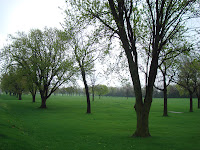The 40th Earth Day is now over, though events centered around it continue. Here in Nebraska, an event called Earth Day Omaha was held last Saturday, while Earth Day Lincoln is scheduled for tomorrow at Antelope Park. In between, there have been events large and small around the state, along with lots of television specials, news stories, and commercial events aimed at the day. At its best, Earth Day reminds us to care for our environment and to think about stewardship; at its worst, Earth Day allows us to put a band-aid on environmental problems, encouraging us to continue in our collective denial of the actual state of our environment.
An oil spill off of the coast of Santa Barbara in 1969 is said to have inspired Sen. Gaylord Nelson to propose the first observance of Earth Day. Forty years later, one of yesterday’s headlines was about an oil rig that had been burning sinking into the Gulf of Mexico. Today we have been learning about the size and nature of the resulting oil slick in the Gulf of Mexico and what effects it may have on living things in the Gulf and along the coast. The good news the day after Earth Day is that there doesn’t seem to be a major oil spill, though there is an oil slick that at the last report I heard measured ten miles by ten miles.
The lack of progress in some areas can be discouraging. However, an article by Seth Borenstein for the Associated Press that was carried in several newspapers on Earth Day noted areas of progress as well. Entitled Earth Day: No more burning rivers, but new threats, the article begins with the good news that the Cuyahoga River no longer is flammable and smog levels are down significantly in several cities.
The question now is whether we can continue to make progress and make it rapidly enough to limit the effects of climate change and pollution to levels that prevent significant loss of individual human lives and whole species of plants and animals. Any resolve any of us felt on Earth Day to be better stewards and do more to improve the environment needs to be put into action. If progress is not being made quickly enough, then we will have to act with even more energy to make up what we can for the time that has been lost.
Earth Day is not part of our liturgical calendar; we in the church are still in Easter. The Sixth Sunday of Easter is Rogation Sunday, another good time to think about our stewardship of the Earth’s resources and to pray for God’s blessings on our efforts to use them well. Throughout the Easter season, though, we might contemplate the miracle of the resurrection and God’s assurance that out of death can come abundant life. The day after Earth Day may be clouded by discouraging circumstances, but we are people who always live in hope. Seeing for one day yesterday that many people were willing to participate in some sort of Earth Day activity or discover some small changes they might make that will make a big difference in the long run indicates that people do care about the environment; the work to be done is to increase the level of that care and public understanding about the work ahead of us.


No comments:
Post a Comment